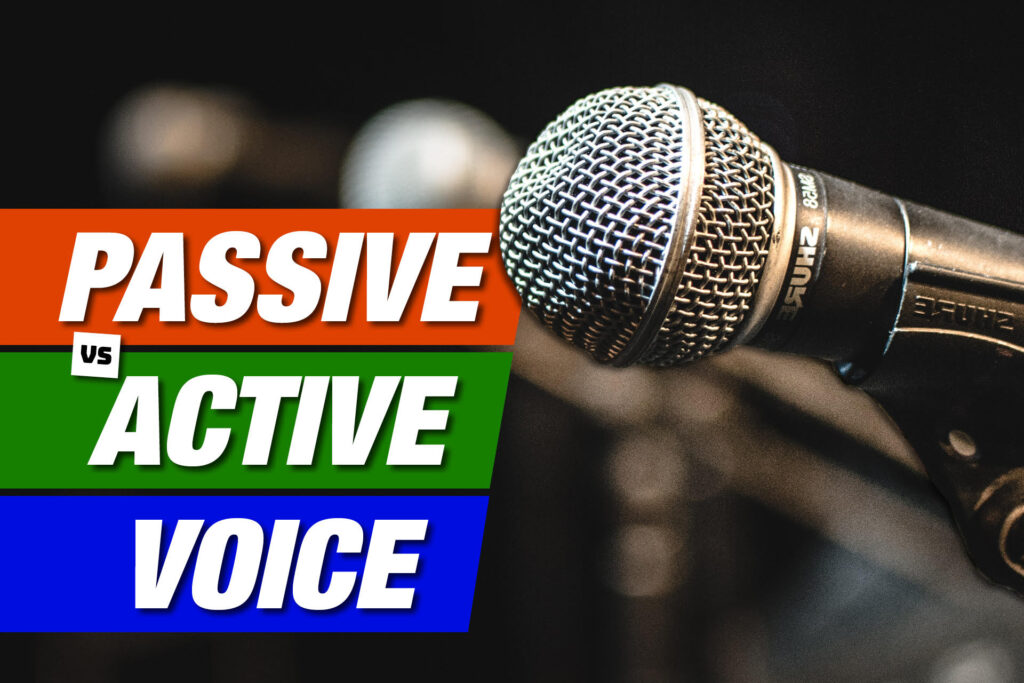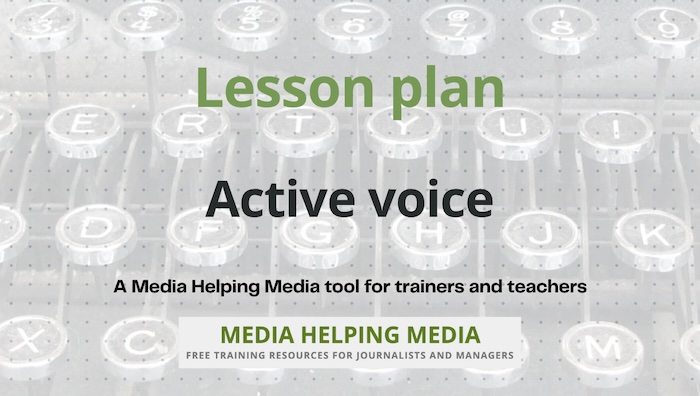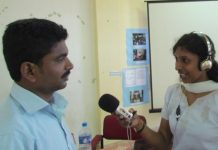
Many news stories are about action. You want to capture that in your writing and seize the attention of your audience. One of the ways is by choosing the active voice.
Strong verbs are the best words for suggesting action: run, leap, hit, accuse, rescue, build, explore, kick, ride, catch, etc. And verbs have two “voices”: the active and the passive.
In the active voice: I wrote this module.
In the passive voice: This module was written by me.
In the active voice, somebody is doing something. In the passive voice, something is being done.
They are both perfectly correct, grammatically, but the active voice is shorter, stronger and more direct. It works much better in news stories. There are exceptions, which we will come to later, but in the vast majority of cases, the active voice gives your story impact and vitality.
Here are two ways of writing the same story:
Passive voice: After several months of better trading conditions, the annual bonus to staff at the Fred Smith store group will be paid for the first time in four years.
Active voice: Staff at Fred Smith stores will get their first annual bonus in four years, after the group reported better trading conditions.
The active voice works better – it is less wordy and it puts the human interest angle first.
So the active voice is a basic part of a journalist’s toolkit. It is the default way of writing an interesting story. But the passive voice is not all bad! Sometimes it is the right choice.
“A lion has eaten the president” is much less effective than “The president has been eaten by a lion”.
This is because the overwhelmingly important subject of the story is the president, not the lion, and you want the president mentioned at the beginning of the story. The passive voice serves better in this case.
So the starting point for news writing is to favour the active voice – and to recognise the comparatively rare occasions when it will be better to use the passive.
But there is another reason to understand the use of the active and passive voices. They do not just affect style and impact, they can also affect meaning.
People in the public eye, particularly politicians, sometimes use the passive voice to obfuscate, confuse and mislead.
The classic example is “mistakes were made”. From the politicians’ point of view that is better than “I made mistakes” because it sets up uncertainty about what happened.
“I made mistakes and I’m sorry” is a very different statement from “mistakes were made and I regret them”.
In the latter case, the politician leaves open the possibility that the mistakes were made by someone else and his regret could easily be about someone else’s error. Because of the way he has phrased his statement, we cannot tell.
It is the skilful use of the passive voice to evade accountability.
Notice that when politicians describe their successes, they say “We took swift action to deal with the situation”. But when they talk about things that have gone wrong, they use words like “it was considered that…”, or “it was felt necessary….”, distancing themselves from the decision-making process through use of the passive voice.
I remember a philandering politician was asked at his latest wedding whether he would now be a faithful husband. He replied: “When a man marries his mistress, a vacancy is created.”
He was saying, in effect, that he would continue to have extra marital affairs – but in his choice of the passive voice, “a vacancy is created”, he was implying that some external force was creating the new opportunities for infidelity that he would no doubt later take up.
Again, the passive voice suggests the politician is an observer of what is happening, rather than the author of it.
So when you are quoting some public figure, make sure to point out any ambiguities created by his use of the passive voice.
You might want also to look at these thoughts on use of the passive voice by David Poulson at the Knight Center for Environmental Journalism.
by Bob Eggington

The choice between active and passive voice significantly impacts clarity, conciseness, and the perceived objectivity of news reporting. While both voices have their uses, understanding their nuances is crucial for effective communication.
Understanding active and passive voice
-
Active voice
- Subject: performs the action.
- Structure: Subject + Verb + Object (e.g., “The reporter interviewed the witness.”)
- Characteristics: Direct, clear, and emphasises the actor.
-
Passive voice
- Subject: receives the action.
- Structure: Object + Verb + Subject (e.g., “The witness was interviewed by the reporter.”)
- Characteristics: Emphasises the action or the recipient of the action, can obscure the actor.
Applications in news reporting
-
Active voice: Best practices
- Clarity and directness: Active voice promotes clear and concise writing, making news easier to understand.
- Accountability: It clearly identifies who performed an action, holding individuals or entities accountable.
- Emphasis on the actor: When the actor is essential to the story, active voice is preferred.
- Examples:
- “The police arrested the suspect.” (Clear and direct)
- “The CEO announced the company’s new strategy.” (Emphasises the actor)
-
Passive voice: Appropriate uses
- Emphasis on the action or recipient: When the action itself or the recipient is more important than the actor.
- Example: “The museum was vandalised.” (Focus on the vandalism)
- Unknown or unimportant actor: When the actor is unknown, obvious, or irrelevant.
- Example: “The road has been closed.” (Actor is implied or unimportant)
- Avoiding blame or accusation: In sensitive situations, passive voice can soften the impact of a statement.
- Example: “Mistakes were made.” (Less accusatory than “Someone made mistakes.”)
- Formal or technical writing: Passive voice is sometimes used in formal reports or scientific writing.
- Example: “The data were analysed.”
- Emphasis on the action or recipient: When the action itself or the recipient is more important than the actor.
Pitfalls of overuse of passive voice:
- Obscuring accountability: Passive voice can hide who is responsible for an action, leading to a lack of transparency.
- Vagueness and ambiguity: It can create unclear or confusing sentences.
- Weak and impersonal tone: Overuse can make writing sound distant and detached.
- Example of bad passive voice: “It was decided that the budget would be cut.” This phrase does not say who made the decision.
Suggested best practices
- Prioritise active voice: The active voice is usually the better choice for clarity, directness, and accountability.
- Use passive voice strategically: Employ passive voice only when it serves a specific purpose, such as emphasising the action, hiding the actor, or softening a statement.
- Avoid unnecessary passive constructions: Review your writing to eliminate passive sentences that weaken the narrative.
- Identify the actor: When using passive voice, consider whether the actor should be revealed to provide context and accountability.
- Maintain consistency: Choose a voice and stick to it within a paragraph or section, unless there’s a specific reason to switch.
- Read aloud: Reading your work aloud can help you identify awkward passive constructions.
- Consider your audience: Who is your audience, and what is the best way to present the information to them.
- Training and review: Regularly review news copy for excessive or inappropriate use of passive voice and provide training to journalists on effective writing techniques.
- Ask “who?”: When reviewing a passive sentence, ask “Who performed this action?” If the answer is important, rewrite the sentence in active voice.
Conclusion
Mastering the use of active and passive voice is essential for producing clear, accurate, and impactful news reporting. By prioritising active voice and using passive voice strategically, journalists can enhance their writing and ensure they are effectively communicating information to their audiences.

Questions
- What is the primary advantage of using the active voice in news writing?
- Provide an example of a sentence in the active voice and then convert it to the passive voice.
- Why might a journalist choose to use the passive voice in a news story?
- How can the use of passive voice affect the meaning of a statement?
- Explain how politicians might use the passive voice to their advantage.
- Compare the impact of the sentences: “A lion has eaten the president” and “The president has been eaten by a lion.” Why is the passive voice more effective in this case?
- Discuss the role of strong verbs in conveying action in news writing.
- Analyse the sentence: “Mistakes were made.” What ambiguity does the passive voice introduce here?
- How does the choice between active and passive voice influence the reader’s perception of responsibility in a statement?
- Reflect on the statement: “When a man marries his mistress, a vacancy is created.” How does the passive voice shape the interpretation of this statement?
Answers
- The primary advantage of using the active voice in news writing is that it is shorter, stronger, and more direct, which helps capture the attention of the audience and gives the story impact and vitality.
- Active voice: “The journalist wrote the article.” Passive voice: “The article was written by the journalist.”
- A journalist might choose to use the passive voice to emphasise the subject of the story or when the doer of the action is unknown or irrelevant.
- The use of passive voice can obscure who is responsible for an action, creating ambiguity and potentially misleading the audience.
- Politicians might use the passive voice to evade accountability by distancing themselves from actions or decisions, as it allows them to avoid directly stating who is responsible.
- In the sentence “The president has been eaten by a lion,” the passive voice is more effective because it places the focus on the president, who is the more important subject of the story.
- Strong verbs are crucial in news writing as they suggest action and help convey the story’s dynamics, making it more engaging for the reader.
- The sentence “Mistakes were made” introduces ambiguity because it does not specify who made the mistakes, allowing the speaker to avoid taking direct responsibility.
- The choice between active and passive voice influences the reader’s perception of responsibility by either clearly identifying the doer of an action (active) or obscuring it (passive).
- The passive voice in the statement “When a man marries his mistress, a vacancy is created” implies that the creation of a vacancy is an external event, distancing the speaker from personal responsibility for his infidelity.
Lesson plan for trainers
If you are a trainer of journalists we have a free lesson plan: Using the active or passive voice in news writing which you can download and adapt for your own purposes.









